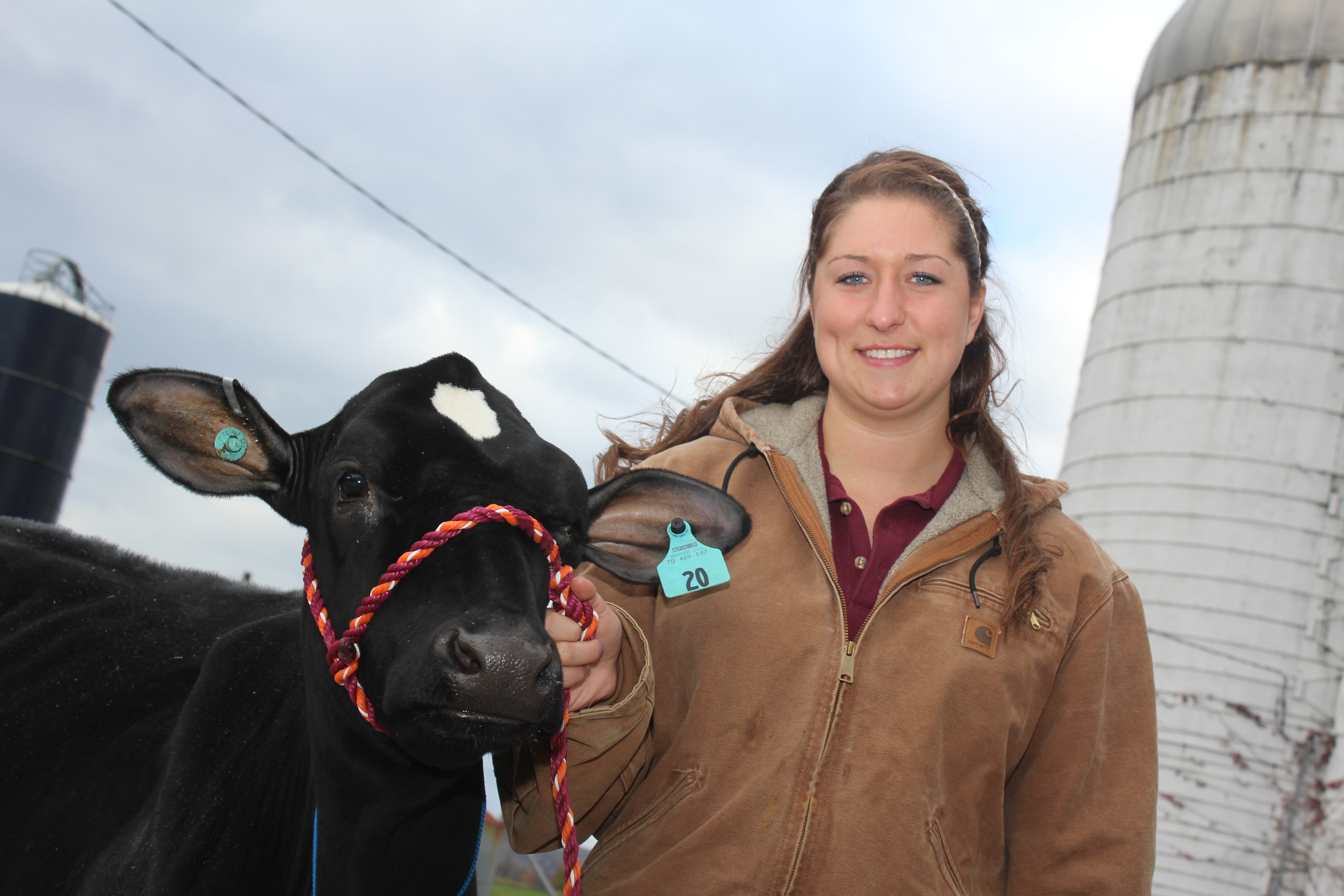Students gain business and entrepreneurial skills through Kohl Centre experience

Chelsea Abbott, a junior majoring in dairy science at Virginia Tech, arrived at the dairy barn early on the day of the Virginia Tech Dairy Showcase to prepare cows for the big show.
But Abbott wasn’t only there to tend to the cows — she also handed out surveys to those attending the showcase to measure their interest in agritourism.
Abbott, from Fairfield, Vermont, is participating in this fall's Kohl Centre Experiential Learning course in the College of Agriculture and Life Sciences, which gives students the opportunity to solve real-world challenges.
In this new course, student-led interdisciplinary teams work on solutions to problems that have public value, covering a variety of challenges ranging from market and production issues, legal and policy hurdles, and financial issues.
Unlike other student projects, Kohl Centre students are the project leaders and faculty serve as facilitators who provide resources and feedback on team progress reports.
It may be the only program of its kind in the country that engages undergraduate students to work alongside land-grant Extension agents and specialist to address problems faced by citizens. At the end of each project, student teams publish a Virginia Cooperative Extension fact sheet with the goal to inform statewide audiences about real-world applications resulting from their research.
Among the projects this fall, students are assessing consumer interest in New River Valley agritourism venues and investigating public interest, and local business owner support, of an on-campus market that features food and fiber products produced by student-run enterprises housed at Virginia Tech.
One student team will present “Economic Impact Analysis of the Christiansburg Aquatic Center” to the Christiansburg, Virginia, Town Council tonight at 7 p.m.
“The opportunity to formally involve Virginia Tech undergraduates in my research and extension projects and programming with the support of the Kohl Centre stakeholders and faculty across campus was a major reason why I accepted this position,” said Kim Morgan, the David M. Kohl Junior Faculty Fellow and an assistant professor of agricultural economics and applied economics.
“In my work as a member of several multi-disciplinary grant projects and in the field with agribusiness operators, it is increasingly apparent that our students need to have applied research experiences and the opportunity to build their own networks to achieve workplace success and add value to their classroom learning,” said Morgan.
Named in honor of David Kohl, professor emeritus in the Department of Agricultural and Applied Economics, the Kohl Centre provides opportunities for student teams to engage in strategic and tactical decision-making processes specific to existing needs identified by firms or individuals. During the Kohl Centre course, project teams craft integrated solutions related to market, production, human resource, legal and financial risks faced by clientele. Students work directly with Kohl Centre clients across a range of diverse subjects involving a variety of disciplinary expertise.
Industry leaders are already excited about the center and how it can help prepare Virginia Tech graduates to solve the many challenges facing the agricultural industry and demands of food and fiber consumers worldwide.
“The agriculture industry is demanding students who have the practical, hands-on experience necessary to address the varied responsibilities that fall on agribusinesses,” said Katie Frazier, president of the Virginia Agribusiness Council. “The education and real-world experiences that the Kohl Centre provides not only gives students this skill set, but also helps develop the next generation of agricultural leaders in Virginia and beyond.”
Kohl Centre students combine their classroom skills with entrepreneurial strategies to address critical needs and knowledge gaps identified by project partners, a process facilitated by Virginia Tech campus and field faculty, industry experts, state agencies, educational experts, consultants, and other individuals.
Students are working on five projects this semester.
Assistant Professors of Agricultural and Applied Economics Gustavo Ferreira and Morgan and a team of students from the departments of dairy science, environmental resource management, animal and poultry sciences, and applied economic management are working on a New River Valley agritourism project.
Professor of Animal and Poultry Sciences Scott Greiner facilitated a project to investigate the economic impact of the Christiansburg Aquatics Center with a team of students from animal and poultry sciences, agribusiness management, and applied economics management.
Katharine Knowlton, the Colonel Horace E. Alphin Professor of Dairy Science, and students from animal and poultry sciences and dairy science spearheaded an investigation of the characteristics of successful student-led enterprises on college campuses.
Associate Professor of Agricultural and Applied Economics and Extension specialist Gordon Groover and a group of students from applied economic management, agribusiness management, and animal and poultry sciences developed on online, how-to solution for Virginia meat and poultry processors interested in improving customer access and service.
Morgan also worked with a team of dairy science and agribusiness management students to explore consumer interest and local business support of a student-operated on-campus market that would feature food and fiber products produced on Virginia Tech’s campus by their cohorts in several departments.




